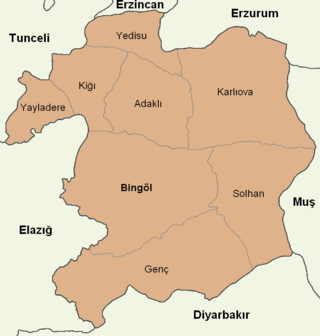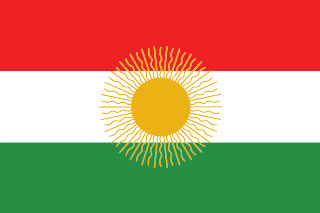Related Research Articles

Kurds or Kurdish people are an Iranian ethnic group native to the mountainous region of Kurdistan in Western Asia, which spans southeastern Turkey, northwestern Iran, northern Iraq, and northern Syria. There are exclaves of Kurds in Central Anatolia, Khorasan, and the Caucasus, as well as significant Kurdish diaspora communities in the cities of western Turkey and Western Europe. The Kurdish population is estimated to be between 30 and 45 million.

Van Province is a province in the Eastern Anatolian region of Turkey, between Lake Van and the Iranian border. It is 19,069 km2 in area and had a population of 1,128,749 at the end of 2022. Its adjacent provinces are Bitlis to the west, Siirt to the southwest, Şırnak and Hakkâri to the south, and Ağrı to the north. The capital of the province is the city of Van, with a population of 525,016 at the end of 2022. The second-largest city is Erciş, with 92,945 inhabitants at end 2022. The province is considered part of Western Armenia by Armenians and was part of ancient province of Vaspurakan. The region is considered to be the cradle of Armenian civilization. Before the Armenian genocide, Van Province was part of six Armenian vilayets. A majority of the province's modern day population is Kurdish.

Hakkâri Province, is a province in the southeast of Turkey. The administrative centre is the city of Hakkâri. The province had a population of 278,218 in 2021. The current Governor is İdris Akbıyık. The province encompasses 8 municipalities, 140 villages and 313 hamlets.

Bingöl Province is a province of Turkey. The province was known as Çapakçur Province before 1945 when it was renamed as Bingöl Province. The province had a population of 283,112 in 2021 and encompasses 11 municipalities, 325 villages and 693 hamlets.

The one-party period of the Republic of Turkey began with the formal establishment of the country in 1923. The Republican People's Party (CHP) was the only party between 1923 and 1945, when the National Development Party was established. After winning the first multiparty elections in 1946 by a landslide, the Republican People's Party lost the majority to the Democratic Party in the 1950 elections. During the one-party period, President Mustafa Kemal Atatürk repeatedly requested that opposition parties be established to stand against the Republican People's Party in order to transition into multi-party democracy. Kâzım Karabekir established the Progressive Republican Party in 1924 but it was banned after its members' involvement in the 1925 Sheikh Said rebellion. In 1930 the Liberal Republican Party was established but then dissolved again by its founder. Despite Atatürk's efforts to establish a self-propagating multi-party system, this was only established after his death in 1938.

The Republic of Ararat, or Kurdish Republic of Ararat, was a self-proclaimed Kurdish state from 1927 to 1931. It was located in eastern Turkey, centred on Karaköse Province. "Agirî" is the Kurdish name for Ararat.

Sharaf al-Din Khan b. Shams al-Din b. Sharaf Beg Bedlisi was a Kurdish Emir of Bitlis. He was also a historian, writer and poet. He wrote exclusively in Persian. Born in the Qara Rud village, in central Iran, between Arak and Qom, at a young age he was sent to the Safavids' court and obtained his education there.

Turkish Kurdistan or Northern Kurdistan refers to the southeastern part of Turkey where Kurds form the predominant ethnic group. The Kurdish Institute of Paris estimates that there are 20 million Kurds living in Turkey, the majority of them in the southeast.

The Koçgiri rebellion was a Kurdish uprising, that began in the overwhelmingly militant Koçgiri region in present-day eastern Sivas Province in February 1921. The rebellion was initially Alevi, but succeeded in gathering support from nearby Sunni tribes. The tribe leaders had close relations to the Society for the Rise of Kurdistan (SAK). The rebellion was defeated in June 1921.

The Sheikh Said rebellion was a Kurdish nationalist rebellion in Turkish Kurdistan in 1925 led by Sheikh Said and with support of the Azadî against the newly-founded Turkish Republic. The rebellion was mostly led by Zaza speakers, but also gained support among some of the neighboring Kurmanji-speaking Kurds in the region.

Ihsan Nuri, also known as Ihsan Nuri Pasha, 1892 or 1893, Bitlis – 25 March 1976, Tehran) was a Kurdish soldier and politician, former officer of the Ottoman and Turkish Army, and one of the leaders of the Ararat rebellion as the generalissimo of the Kurdish National Forces.

The following is a list of tribes of Kurdish people, an ethnic group from the geo-cultural region of Kurdistan in Western Asia.
Kamran Inan, Turkish politician, statesman of Kurdish origin, diplomat and scholar. He was born in Hizan, Bitlis Province. Representative in Parliament from Van and Bitlis numerous times. Graduate of Ankara University Faculty of Law, and Ph.D. in Law from University of Geneva. At various times Turkish UN Ambassador, permanent UN representative, Turkish Minister of Energy and Natural Resources and Minister of State, Senator from Bitlis and member of Foreign Affairs Commission. He published numerous books on Turkish politics and history.

The Ararat rebellion, also known as the Ağrı rebellion, was a 1930 uprising of the Kurds of Ağrı Province, in eastern Turkey, against the Turkish government. The leader of the guerrilla forces during the rebellion was Ihsan Nuri of the Jibran tribe.

During World War I, several Kurdish rebellions took place within the Ottoman Empire.
The Deportations of Kurds by Turkey refers to the population transfer of hundreds of thousands of Kurds from Turkish Kurdistan that was perpetuated by the Ottoman Empire and its successor Turkey in order to Turkify the region. Most of the Kurds who were deported were forced to leave their autochthonous lands, but the deportations also included the forced sedentarization of Kurdish tribes. Turkish historian İsmail Beşikçi emphasized the influence of fascism on these policies, and Italian historian Giulio Sappeli argued: "The ideals of Kemal Atatürk meant that war against the Kurds was always seen as an historical mission aimed at affirming the superiority of being Turkish." Occurring just after the Armenian genocide, many Kurds believed that they would share the same fate as the Armenians. Historians Dominik J. Schaller and Jürgen Zimmerer state that this event "not only serves as a reminder of the unsettling fact that victims could become perpetrators, but also that perpetrators [as some Kurds were during the Armenian Genocide] could turn victims".
Kurdish-Turkish peace initiatives, there were several, since the conflict with the Kurdistan Workers' Party began in 1978. Some were successful, others not. But the first real approach to the Kurdish question in Turkey came after the Government of Turgut Özal decided to end the policy of denial of the Kurds and allow the Kurdish language to be spoken in 1991 and later on in the same year also to be broadcast.

Miralay Halid Beg Cibran was a Kurdish soldier in the Ottoman Army and chairman of the Azadî organization.
Şêxbizin is a Kurdish tribe present near Koy Sanjaq in Kurdistan Region, Iraq with smaller communities dispersed throughout Turkey. While the tribe speaks Sorani in Kurdistan Region, the ones in Turkey have kept their tribal sub-dialect of Laki called Şêxbizinî or Kirmancekîman. Nonetheless, many in Turkey only know Turkish due to the assimilatory policies of Turkey.
References
- ↑ Sykes, Mark (1908). "The Kurdish Tribes of the Ottoman Empire". The Journal of the Royal Anthropological Institute of Great Britain and Ireland. 38: 465–6. doi:10.2307/2843309. JSTOR 2843309.
- ↑ Sylvia Kedourie (2013-09-13). Seventy-five Years of the Turkish Republic. Taylor & Francis. p. 9. ISBN 978-1-135-26705-6.
- ↑ Kemal Kirisci; Kemal Kirişci; Gareth M. Winrow (1997). The Kurdish Question and Turkey: An Example of a Trans-state Ethnic Conflict. Psychology Press. p. 103. ISBN 978-0-7146-4746-3.